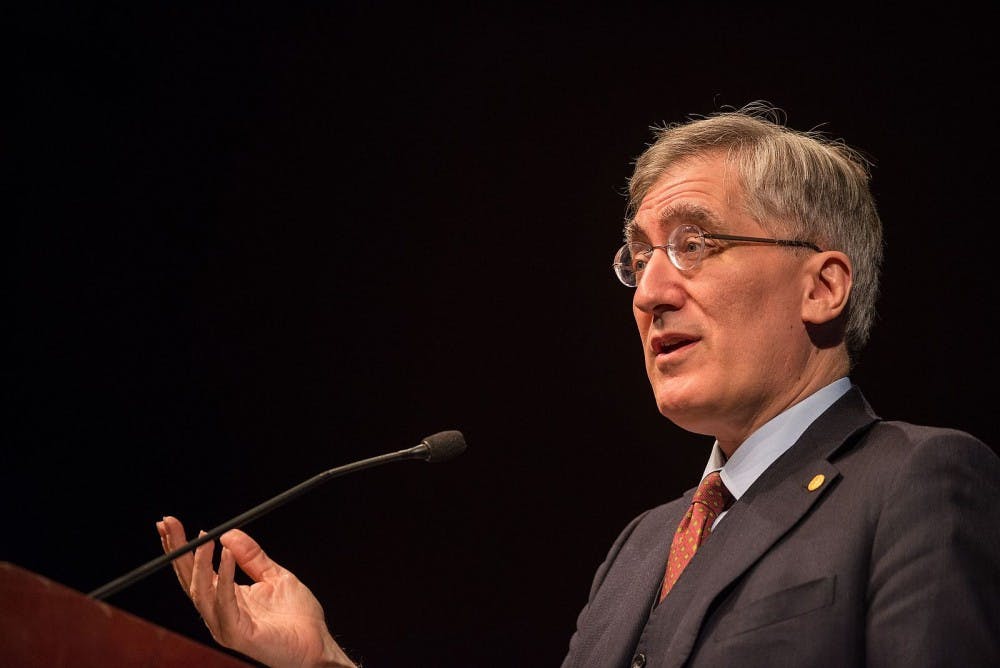President Trump signed an executive order on May 4 intended to weaken the Johnson Amendment, a provision in the 1954 Internal Revenue Code that is designed to prohibit nonprofit or 501(c)3 organizations from endorsing a political candidate. Named for former President and then-Senator Lyndon B. Johnson, the provision concerns organizations such as churches, charitable foundations, and universities.
In the ensuing controversy over Trump’s Presidential Executive Order Promoting Free Speech and Religious Liberty, conservative Christian leaders have criticized the order as a hollow. Among them? University professor Robert George.
Calling the president out on Twitter, George wrote that the order was a “betrayal.” The ‘Prince’ asked George why he felt so strongly.
“President Trump, when he was a candidate, promised that he would seek robust protections for religious liberty,” George said. “He assured supporters that he would do so through both executive orders when appropriate, and legislation.”
The executive order, as the Associated Press reports, does not alter the law on the books. Although Trump said that the order is intended to protect churches from being pursued by the IRS for engaging in political speech, the 1954 law, which is considered an annoyance by conservatives, remains. George said that the law is “not in the top 50 of the religious liberty concerns of any major religious freedom advocacy group that I know of.”
George said that his frustration with the order lies in Trump’s decision to focus mainly on the Johnson Amendment, which produced an easy win for Trump, but does little. The amendment, “which restricts partisan endorsement by clergy in their official capacity,” is routinely flouted.
“It’s never enforced,” George added. “It’s arguably unconstitutional.”
“But the reason the ACLU isn’t even suing him is because [the executive order] doesn’t do anything,” George said. “By making a big deal of [the Johnson Amendment], [Trump] created the appearance of doing something for religious liberty, but it, in fact, doesn’t cost him anything. That’s what makes him such a gifted deal-maker. He makes people on opposite side of the table think that they’re getting something when he doesn’t have to do much to give it in the first place.”

George underscored that conservatives like him need to “wise up and demand more of [Trump].”
“We’re not asking him to abuse his power,” explained George. “We’re asking for substantive protections for people who, on religious grounds, or on grounds of conscience could not participate in activities that they deem to be immoral.”
“I don’t think Trump is a man with many principles, if any,” George added. “He’s a transactional person. I think the future of religious liberty depends on what he thinks is necessary to retain support of religious conservative supporters.”
The existing 1954 law is designed to prohibit tax-exempt organizations from engaging directly in support or opposition to a political candidate or campaign; however, it doesn’t prevent these organizations from supporting public policy initiatives or other efforts that heavily favor one side of an election. Explicitly, such organizations cannot donate to a candidate or make public statements in support of a particular candidate.

These provisions, however, have not kept such organizations from pursuing political work through other means — those not penalized by the IRS, most notably in church involvement of the Civil Rights Movement.
“People on the other side of the debate — they interpret that as a right to discriminate,” George said. Regarding the law’s effect, he gave an example of exercising religious liberty as opposed to using it to discriminate.
“For example,” George explained, “a nurse who cannot, in good conscience, participate in abortions. This is a right to honor her own conscience, not a license to discriminate.”
“Her livelihood, as a nurse, should not depend on engaging in what she considers unjust homicide,” he added.
Paul Draper ’18, former president of the Princeton College Republicans and publisher of The Princeton Tory, a conservative student magazine, agrees with George’s assessment.
“If the executive order is all the Trump administration ends up doing, that certainly will be a failure on their part, but if it’s an indication that we’ll do more, then that’s good,” Draper said. I don’t think the executive order in its current form is sufficient.”
He also agreed that the Johnson Amendment is not a priority, but is still an issue. Draper explained that a big issue for those concerned about issues of religious liberty is taxpayer funding for health care plans that include abortion. Draper said he hopes that the order is just the first step toward ensuring greater religious liberty.
George explained that he does not view religious freedom as absolute and can be overridden if certain criteria outlined the Religious Freedom Restoration Act are met. The intervention must be used to further a compelling government interest and be the least intrusive or restrictive means of protecting that interest.
“Religious freedom for me is not absolute,” George said. “It can be overridden when necessary.”
George is the McCormick Professor of Jurisprudence at the University, and is the founding director of the James Madison Program in American Ideals and Institutions, a program in the politics department that explores questions of American constitutional law and Western political thought.








